 |
 |
 |
David O'Leary spent big in the summer of 1999, signing Eirik Bakke,
Michael Bridges, Darren Huckerby, Danny Mills and Michael Duberry. There was a mixed start with a draw at home to Derby, a 3-0 win at Southampton
and a defeat to Manchester United, but the side came to life with a 2-1
win at Spurs, though they finished with ten men with Alan Smith dismissed
for a petulant head butt. United went on to win ten games on the run, a club record sequence which
ended with an exciting 4-4 draw at Everton on 24 October. Jason Wilcox arrived from Blackburn in December and his presence on the
left freed Harry Kewell to play as an out and out striker, but United
stalled between December and February, losing four out of six games, including
heavy beatings at Liverpool and Arsenal. Leeds looked a good bet in the FA Cup after winning 5-2 at Manchester
City, but were undone by a Benito Carbone hat trick in the fifth round
at Aston Villa. They had to face an FA disciplinary hearing after an ill-tempered match
against Tottenham in February. The ill feeling between O'Leary and George
Graham seemed to affect the players who took no prisoners in a bruising
encounter. The second half was barely five minutes old when a late challenge
by Bowyer on Stephen Clemence sparked a mass brawl between players from
both sides in the middle of the pitch, which ended with referee Gallagher
giving Bowyer his tenth caution of the season. United were tested to the limit by their UEFA Cup pairing with Roma;
the first leg saw the Italians, with Totti pulling the strings, play Leeds
off the park, but Nigel Martyn excelled as Leeds escaped with a goalless
draw. A week later, a dazzling piece of Harry Kewell brilliance gave Leeds
an aggregate lead. Picking up the ball 25 yards out, he beat a defender
and let fly from range. Goalkeeper Antonioli got a hand to his shot, but
watched in despair as the ball flew into the net. With nine minutes left
Smith came on for a tiring Bridges and wound up the Roma defence, provoking
two dismissals. Zago was sent off for a second yellow card after a challenge
on Smith, sparking chaotic scenes which ended with Candella also dismissed
for butting Huckerby. United's 3-0 victory in the first leg of their quarter-final against
Slavia Prague made the outcome a formality though defeat in the return
launched a run of six successive reverses. The semi-final pairing with Galatasaray, was marred by the horrific stabbings
of Christopher Loftus and Kevin Speight before the first leg in Istanbul,
which a deflated United side lost 2-0. UEFA decreed that the Turkish fans should be excluded from the second
leg at Elland Road, which ended in a draw. Just before the break Harry
Kewell was dismissed for supposedly stamping on Georghe Popescu. Television
replays proved that no contact had been made, but the Rumanian's play
acting influenced the referee. Galatasaray were worthy winners over the
two legs but it might have been a different outcome if United's resolve
had not been sapped by the off field incidents. A home defeat by Chelsea and a 4-0 thrashing by Arsenal rubbed salt in
fresh wounds and left many at Elland Road wishing everyone would go away
and leave them to grieve in peace. Good wins against relegated Watford and Sheffield Wednesday moved United
back into third place and they went into the final day a point clear of
Liverpool. Both clubs were away, with Liverpool looking to have the easier
task, at relegation-threatened Bradford City, while Leeds faced West Ham. Liverpool were swept aside by a tide of emotion at Valley Parade as former
Leeds centre-back David Wetherall scored an early goal to give City the
win they needed to keep them up. Leeds played out a sterile 0-0 draw at
Upton Park to capture a coveted place in the Champions League. The signings of French midfielder Olivier Dacourt, Celtic's Australian
striker, Mark Viduka and £4.75m Liverpool defender Dominic Matteo added
class to the squad in preparation for 2000/01. Alan Smith scored twice against 1860 Munich in the qualifying round as
Leeds won both legs to gain passage to the group stage. Their reward was
a place in a pool The opening game, in Barcelona's Nou Camp, was an absolute disaster,
with a side already savaged by injury further depleted when Jason Wilcox
broke his ankle in a training session. Barcelona were on fire and the
4-0 hammering came as a harsh welcome to the competition. Leeds beat Milan at Elland Road a week later and built on the success
by running in six goals without reply against Besiktas. Other results were going United's way; after Barcelona beat the Whites,
they surprisingly lost 3-0 against Besiktas and Milan came away from the
Nou Camp with a 2-0 win. The standings now had Milan and Leeds with six
points and Barca and Besiktas trailing with three apiece. Leeds rose to fourth in the Premiership with Elland Road victories over
Tottenham and Charlton. Nigel Martyn sustained an injury in the warm up
against the Addicks, bringing young deputy Paul Robinson in for a testing
return match with Besiktas. Robinson acquitted himself well in a goalless
draw during which Leeds managed just one effort on target. With Milan
and Barcelona drawing, a Leeds victory against the Spaniards would see
them through to the next stage. The Elland Road clash started well for Leeds, who took a fifth minute
lead when Bowyer curled in a long-range free kick, but the remaining eighty-nine
minutes were characterised by constant Barcelona pressure. United still held their slim lead as the assistant referee signalled
four minutes of stoppage time but when Gerard hit the post for Barcelona,
Rivaldo picked up the rebound and drilled home from ten yards. The Leeds
dejection was evident, though a draw in Milan would still be enough. They conceded a penalty after twenty-six minutes in the San Siro but
Shevchenko's spot kick clipped the foot of the upright as Robinson went
the wrong way and Dominic Matteo headed a memorable opening goal to capitalise
on the reprieve. After coming close to an equaliser three times in the
opening minutes of the second period, Milan appeared to ease up, prompting
suspicions that they would prefer Leeds to go through to the next round
at Barcelona's expense. Serginho equalised late on but United held out
to take the point they needed. Life was to get no easier as the draw for the next stage pitted Leeds
against the holders, Real Madrid, along with Lazio and Anderlecht in a
group acknowledged as the most difficult of the four. United began against Real Madrid at Elland Road and were always chasing
shadows, flattered by a 2-0 defeat. The character that exemplified their displays in the first group stage
returned when they travelled to meet Lazio in Rome; Alan Smith scored
his first goal in nearly two months to secure a late victory. Squeezed in between the European glory nights, Leeds recovered from being
3-1 down to beat Liverpool 4-3 in a Premiership thriller with Mark Viduka
scoring all four. An £18m bid secured the signing of West Ham's England defender Rio Ferdinand,
setting a world record for a defender. The Londoner was soon joined by
Irish striker Robbie Keane, signing on an initial six month loan deal
from Inter Milan. Just as the focus should have been on football, the club were distracted
by a high profile court case. Lee Bowyer, Jonathan Woodgate and reserve forward Tony Hackworth, along
with two of Woodgate's friends from his native North East, were charged
with grievous bodily harm with intent after an assault on Asian student
Sarfraz Najeib outside Leeds' Majestyk nightclub in January 2000. Michael
Duberry was also accused of conspiring to pervert the course of justice. The players could have been forgiven for letting their minds wander,
but Bowyer reached new heights. His was a superb contribution throughout
the European adventure and he scored the winner, his fifth European goal
of the season, as Leeds came from behind at home to Anderlecht. The midfielder
picked up a booking and was suspended for the return in Anderlecht had a long winning sequence on their own pitch but Leeds were
3-0 up at half time as Smith and Viduka rediscovered their scoring touch.
Anderlecht pulled a goal back, but Harte converted a penalty in the closing
stages to wrap up a 4-1 victory. Real drew 2-2 with Lazio, meaning that Leeds could not be caught by either
Anderlecht or the Italians, and were through to the last eight, the first
English club to do so. Back in the domestic game, they followed up by ending another club's
lengthy unbeaten home run with a 2-1 win at Spurs that set them up nicely
for a home clash with Manchester United on March 3. United could have taken a first half lead, but Ian Harte's spot kick
was saved by Fabien Barthez, and after 63 minutes Luke Chadwick gave the
Reds the advantage from close range. Leeds fought back with seven minutes
to go, Viduka diving to head home at the back post. When Leeds pressed
again, Reds defender Wes Brown diverted Lee Bowyer's cross into his own
net, but referee Graham Barber disallowed the goal for offside. Victories against Charlton and Sunderland left the Whites locked in a
three-way battle with Liverpool and Ipswich for the remaining Champions
League place. April began with an impressive 3-0 victory against Deportivo in the first
leg of the current quarter-finals. Rio Ferdinand headed the third and
scored again a couple of weeks later to give Leeds the lead as they won
2-1 at Liverpool. During the following week, matters came to a head in the Woodgate-Bowyer
trial. On 8 April, the Sunday Mirror's interview with the father of the
alleged victim carried accusations of racial motivation. The judge halted
proceedings when it was found that at least one member of the jury had
seen the report, and he ordered an October retrial. Duberry and Hackworth
had already been acquitted, but while the jury were out considering their
verdicts on the others, a number of jurors saw the article. Bowyer and Woodgate were both available for selection for the return
leg against Deportivo, though Woodgate would not play again all season.
When Deportivo scored twice in the first half, things looked bleak but
a beleaguered Leeds defence held on to secure an aggregate win. United were held to a goalless draw in the home leg of the semi-final
against Valencia, and Bowyer was given a ban from the second leg after
being captured by TV cameras treading on the chest of a grounded opponent.
The fire and determination that had inspired Leeds since Christmas had
evaporated and the second leg was lost 3-0 with Alan Smith sent off for
an ill-judged two footed assault on a Spaniard right at the death. It
was a sad and undignified end to a marvellous European adventure. A day before the match, Ipswich had stolen fourth spot by beating Manchester
City, while Liverpool's draw with Chelsea had left them clear in third. On 12 May, Leeds bounced back from a desperate week to hammer relegated
Bradford City 6-1 and draw level on points with Ipswich, but now with
a superior goal difference. With one match left, at home to Leicester,
and Liverpool and Ipswich travelling to Charlton and Derby, any one of
the three sides could qualify for the remaining Champions League spot.
If Leeds could win, only a Liverpool victory could deny them third place. Leeds secured a nervy win but their hopes were dashed by a comprehensive
Liverpool success at Charlton. It had been the most exciting season that
Leeds fans had known for years, and the most memorable European challenge
since the days of Bremner, Giles and Hunter. After a decent start to 2001/02 with victory against Southampton, United
were involved in a bitter encounter at Arsenal. They won the game but
had both Lee Bowyer and Danny Mills sent off. The club were pilloried
for a lack of discipline, but they had two wins out of two. Two goalless
draws Their cup campaigns started well with UEFA Cup success against Maritimo
and a 6-0 victory over Leicester in the Worthington Cup, inspired by a
hat trick from Keane. O'Leary's transfer spending went on as Derby midfielder Seth Johnson
(£7m) and Liverpool striker Robbie Fowler (£11m) swelled the ranks. It
took Fowler a while to find his shooting boots, and his debut came in
a drab goalless draw at Fulham. When the England striker did manage to
find the net, with two at home to Everton on December 19 helping to establish
a 3-0 lead, the United defence evaporated, leaking two goals and Leeds
only just held on for the three points. The retrial of Bowyer and Woodgate commenced in October. On December
14, both men were cleared of assault, though Woodgate was convicted of
a lesser charge of affray. He escaped a prison sentence with the judge
suggesting that he had suffered enough and was sentenced to 100 hours'
community service. Bowyer was cleared of all charges but ordered to pay
legal costs of more than £1m. He was also fined four weeks' wages by the
club and warned regarding his future behaviour. He was transfer listed
when he refused to accept the sanction but eventually climbed down though
he refused to accept a new contract when it was offered. It made little
difference to his game. He was outstanding when he returned to the side
against Newcastle on December 22, scoring as United took a 3-1 lead. They
collapsed thereafter, leaking three goals to lose a game that had been
dead and buried. However, victories followed at Bolton and Southampton and the revival
seemed complete when two goals by Mark Viduka and a special from Fowler
brought an easy victory against West Ham on New Year's Day, restoring
United to the head of the Premiership. Their FA Cup challenge ended at the first hurdle when they lost a high-charged
tie at Cardiff. Viduka opened the scoring but the Bluebirds struck back
after Smith received his second red card in six weeks. The rest of January brought poor defeats against Newcastle, Chelsea and
Liverpool, while Bowyer and Danny Mills were given lengthy suspensions. Leeds steadied the ship a little, drawing three straight games, but went
out of the UEFA Cup when a late goal from PSV settled the fourth round
tie. Their form in the Premiership was dismal - after beating West Ham
on January 1, United failed to win until overturning struggling Ipswich
on 6 March. Their chances of a Champions' League spot were all but gone. Victories against Ipswich, Blackburn and Leicester gave way to a poor
Easter, with United beaten 4-3 at home by Manchester United and losing
at Tottenham, though victories against Derby and Middlesbrough brought
a fifth place finish and the solace of a UEFA Cup berth. At the beginning of March, chairman Peter Ridsdale announced interim
losses of £14m, stressing the urgent need to tackle the rising debt. At
least £15m was required from player sales, he said, in order to improve
liquidity. Long-term borrowing had risen to more than £85m in pursuit
of the golden Champions League egg and the price of failure was crippling.
The news confirmed fears in the City that the club had borrowed too heavily.
The squad was independently valued at £198m but the share price placed
the entire club's worth at just £25m. With a year remaining on his contract, Lee Bowyer had been given permission
to discuss a move to Liverpool. Leeds had hoped for a £15m fee, but in
the end agreed on £9m. With deal all but sealed, it fell apart at the
twelfth hour, with Liverpool claiming that Bowyer was not wholly committed
to Anfield. It left Leeds in a sticky financial position, needing to raise
funds, but finding it increasingly difficult to find takers for any but
their most valued assets. One departure that did happen was particularly galling. Captain Rio Ferdinand
had become the jewel in the Leeds crown and his outstanding performances
during the World Cup finals made him the subject of intense transfer speculation.
Peter Ridsdale gave assurance after assurance that he would not be sold,
and Ferdinand professed his loyalty, but the promises were empty and a
£30m record deal was agreed with Manchester United, provoking bitter reaction
from fans. By then, more controversy had engulfed Elland Road, as manager David
O'Leary was sensationally and suddenly sacked on 27 June. With Terry Venables the surprise choice to replace O'Leary, initial expectancy
was high, sparking daily rumours of big money deals. Reality soon began
to bite, with the only arrivals being Paul Okon, Nicky Barmby and unknown
Swedish defender Teddy Lucic. While the departure of Robbie Keane in a £7m move to Tottenham in the
transfer window set the fans grumbling, United opened the season by beating
newly Hopes of a decent season, though, vanished during a bleak November and
December. There were a few happy moments: the UEFA Cup-tie against Hapoel Tel Aviv
brought a tour de force display from four-goal Alan Smith; a 3-0 victory
at Bolton; a win at Sunderland with sixteen-year-old James Milner becoming
the youngest ever scorer in the Premiership, then adding another in the
2-0 defeat of Chelsea. The other scorer against the Londoners was Jonathan Woodgate, among the
departures in January, despite Ridsdale's promises that the 'crown jewels'
would not be sold. He was followed out of Elland Road by Lee Bowyer, Olivier Dacourt and
Robbie Fowler, with the latter's £6m sale to Manchester City only going
through after United accepted a down payment of £3m and agreed to stand
£500,000 of the striker's annual wage until 2006. The fans turned on Venables, and when a decent FA Cup came to an end
at Sheffield United, he was replaced by former Sunderland boss Peter Reid,
appointed caretaker until the end of the season. The release of poor interim financial results at the end of March coincided
with the news that Peter Ridsdale was also out, with the chairman announcing
his own departure and welcoming in Professor John McKenzie as his successor.
Outstanding long-term debt had soared to £78.9m at the end of December
2002, with the club needing to find £16.9m as further instalments on Fowler,
Johnson, Keane and Barmby became due. Reid presided over a revival of sorts as United won 6-1 at seventh-placed
Charlton on 5 April, the Aussie duo of Harry Kewell and Mark Viduka snaffling
five goals between them. If the team could play like this, wondered the
pundits, why had they struggled all season? The result took them six points clear of relegation, but the next couple
of weeks brought a fortunate 2-2 draw at home to Tottenham, and then a
dire 3-2 reverse at Southampton. With West Brom and Sunderland formally
doomed to demotion, the fight to avoid the final relegation spot was between
Leeds, Bolton and West Ham. On Easter Monday, 21 April, Bolton drew at Blackburn while West Ham beat
Middlesbrough. The following day Mark Viduka netted both goals in a defeat
of Fulham to restore a six-point cushion. The relegation pendulum swung dramatically against Leeds the following
weekend when they lost 3-2 to Blackburn. Bolton pulled out a last gasp
equaliser to draw with Arsenal and move within a point of Leeds. The next
day West Ham earned all three points with the only goal at Manchester
City. United's penultimate game of the season, a visit to Arsenal, was fixed
for Sunday, 4 May, giving Bolton and West Ham the chance to draw first
blood on the Saturday. West Ham beat Chelsea and Bolton drew at Southampton,
leaving the three teams level at 41 points apiece. Reid, wondering whether
the players turning up at Highbury would be the team that thrashed Charlton
or the meek losers who had capitulated so often, had his answer after
just four minutes; Kewell ran on to a long ball to net an unstoppable
opener. Thierry Henry equalised after half an hour, but Leeds were fighting
like men possessed and Ian Harte scored with a characteristic free kick
three minutes into the second half. Arsenal were level again on the hour,
with Dennis Bergkamp on hand to sidefoot home. Reid would have settled
for the point, but with two minutes remaining he got a bonus. There were
suspicions of offside when Matteo's long ball found Viduka, but the Aussie
controlled the ball instantly, cut in on his left and curled a brilliant
winner round England keeper David Seaman. United were safe! With the club determined not to see Harry Kewell disappear on a free
transfer in 2004, the Aussie was given permission to listen to offers.
Leeds could have got more money by selling Kewell to Chelsea, Manchester
United or Barcelona, but the winger had set his heart on Liverpool and
moved for a bargain £5m. Chelsea midfielder Jody Morris arrived on a free transfer while Peter
Reid went shopping in the loan market, recruiting Arsenal winger Jermaine
Pennant, French League players Didier Domi, Lamine Sakho, Zoumana Camara,
Cyril Chapuis and Salomon Olembe, and Brazilian World Cup winning defender
Roque Junior. Leeds' vulnerable underbelly was exposed in the 4-0 drubbing at Leicester
on 15 September when Reid blooded Roque Junior, despite the fact that
the Brazilian had just jetted in after two gruelling World Cup qualifying
games. The outcome was similar a week later against Birmingham, with Roque
Junior dismissed for a second bookable offence during a 2-0 defeat. Only days previously, it took an injury-ime header from goalkeeper Paul
Robinson to rescue the Worthington Cup-tie against lowly Swindon. United were already bottom when they lost at Portsmouth on 8 November,
the 6-1 reverse their worst ever in the Premiership. A forlorn Reid admitted,
'There was no desire to play football, to win a tackle … That second half
was the worst 45 minutes of my managerial career.' Barely 48 hours later,
Reid was sacked and Eddie Gray installed as caretaker manager. It was clear that he would have no money to play with. Leeds announced
a pre-tax loss of £49.5m, a new record for a Premiership club, with warnings
that unless they could reschedule the massive debt, administration beckoned. Former Chelsea supremo Trevor Birch was appointed Chief Executive, recruited
specifically to manage the finances. It was hoped that a cash injection
of £4.4m from deputy chairman Allan Leighton and a rights issue would
stabilise matters but negotiations collapsed at the end of November. A
standstill arrangement was agreed with creditors, but after a seemingly
endless series of deadlines, shares in the club were suspended and the
standstill agreement scrapped on 27 February. Birch managed to scrape together sufficient cash to keep things ticking
over and was able to breathe a sigh of relief when the sale of the club
was completed on 19 March, after Adulant Force, a consortium fronted by
local accountant and insolvency practitioner, Gerald Krasner, tabled an
acceptable package. The overall debt, understood now to be over £100m, was slashed to around
£20m. Gerling Insurance, the credit insurers of player-leasing agents
REFF, who were owed £21.3m, cut their losses and agreed a substantially
lower one-off payment. The bondholders agreed to take a lump sum to settle
a liability of £60m. The other major creditors, HMRC, would be paid off
over an extended period along with other minor liabilities. The Krasner
consortium had put up £5m of their own money to provide working capital,
with further personal guarantees of £5m, and borrowed another £15m from
former Watford chairman Jack Petchey. After Eddie Gray's first match in charge ended in a sixth successive
defeat, the manager discarded the foreign loanees, with Radebe and Viduka
the only non-Brits in his eleven for the trip to Charlton on 29 November
and Pennant the only loan player selected. He employed a 4-5-1 formation,
with Alan Smith and Dominic Matteo partnering David Batty in central midfield,
to stifle the opposition and deny them space. Pennant and James Milner
operated on the flanks with Viduka as lone striker. The changes reaped
dividends; United smothered the life out of Charlton and secured a narrow
victory. Another hard working performance at home to big spending Premiership
leaders Chelsea brought a shock point as United moved above Wolves and
within two points of clearing the relegation zone. On 14 December, Leeds went two goals up against Fulham, before the Londoners
fought back to 2-2. Two minutes from time Dominic Matteo headed a winner
from Harte's cross to register his first goal since scoring against Milan
in the San Siro. Draws followed against Manchester City and Villa, but United collapsed
3-1 against bottom club Wolves on 28 December. David Batty was told that he would not figure in Eddie Gray's plans for
the rest of the season, following dark hints that the midfielder was becoming
a disruptive dressing room influence, while Mark Viduka was missing for
several weeks after being granted leave to spend time with his seriously
ill father in Australia. Viduka returned as United thrashed Wolves 4-1
on 10 February. They drew with Liverpool and beat Manchester City, but
a 4-1 defeat at Birmingham left them five points below safety with eight
games left. They beat Leicester 3-2 but Viduka's time wasting tactics in the closing
seconds saw him dismissed for a second bookable offence, putting him out
of a decisive fixture against Portsmouth. A 2-1 win at Blackburn brought up the first back-to-back victories of
the season, before Nigel Martyn returned to Elland Road to haunt his former
colleagues, his brilliant display denying Leeds victory against Everton. Thierry Henry's four-goal super show for Arsenal left Leeds in tatters
as the Gunners scored five times without reply. Defeats followed at Portsmouth and Bolton. Viduka gave his team a first
half lead at the Reebok, but more indiscipline saw him dismissed and ten
men unable to prevent Wanderers winning 4-1. Alan Smith was in tears at
the end - United's dire goal difference meant that a fourteen-year stay
in the top flight had come to an ignominious end. A 3-3 draw against Charlton
gave the fans the chance to pay a final farewell to the striker. During the week the club unceremoniously ended Eddie Gray's time at the
helm and announced that Kevin Blackwell would assume temporary control,
supervising a last day visit to Chelsea from which Leeds emerged creditably
with a 1-0 defeat. Blackwell's permanent appointment was delayed for weeks while United
considered their options and fruitlessly discussed potential new investment
with local businessman Steve Parkin. Paul Robinson was sold to Tottenham for £1.7m, the Board confirming that
the cull of the playing squad would be deep. The contracts of a number
of players, including Jason Wilcox, Michael Bridges and David Batty, were
allowed to lapse. Alan Smith joined Manchester United in a £7m deal, James
Milner was off to Newcastle for £5.25m and Middlesbrough paid £4.5m for
Mark Viduka, but no money changed hands as Stephen McPhail, Nick Barmby,
Dominic Matteo, Ian Harte and Danny Mills departed. But for injury, Seth
Johnson and Eirik Bakke might have joined the exodus, while Michael Duberry
remained at the club after refusing to take a wage. Lucas Radebe signed a one-year contract extension and Gary Kelly opted
to stay, leaving Kevin Blackwell five players with significant first team
experience. He had a clutch of promising youngsters in Scott Carson, Frazer
Richardson, Simon Johnson, Matthew Kilgallon, Aaron Lennon, Jamie McMaster
and 16-year-old centre-back Simon Walton, but the squad was distinctly
threadbare. Manchester United's Danny Pugh and Middlesbrough's Michael Ricketts came
in as makeweights in the sales of Smith and Viduka. Scottish international
keeper Neil Sullivan was a key recruit from Chelsea and centre-back Paul
Butler, who had won promotion previously with Sunderland and Wolves, was
confirmed as club captain. Clarke Carlisle, Julian Joachim, Jermaine Wright,
Matthew Spring and Danny Cadamarteri were sound if unexciting signings,
but there was some surprise over the return of former striker Brian Deane,
now 36, following his release by West Ham. There was still the money to fund the £1m required to sign West Brom
midfielder Sean Gregan and pay Southampton £200,000 for Scottish international
left-back Stephen Crainey. United fielded seven debutants in their Championship opener, at Elland
Road against Derby - Sullivan, Butler, Wright, Walton, Pugh, Joachim and
Ricketts - with Kelly, Duberry and Kilgallon featuring in defence and
Frazer Richardson drafted in on the right flank. United won thanks to
a Richardson goal but three days later defeat at Gillingham set the tone
for the next month as a succession of poor results left Leeds sixteenth. The defence consolidated but it was clear that United had severe problems
up front - Joachim and Ricketts had managed one apiece and Deane had to
wait until 26 October to break his duck. Kevin Blackwell paid Preston £650,000 for Northern Irish international
David Healy and signed Sunderland wide man John Oster on loan, allowing
him to adopt a 4-3-3 formation. It worked - Leeds hammered Preston 4-2
at Deepdale and destroyed QPR 6-1 with Deane netting four times, before
back-to-back wins against Sunderland and Plymouth edged United nine points
clear of the relegation zone. Blackwell gave teenager winger Aaron Lennon his head. Lennon, who had
become the Premiership's youngest debutant in August Financial issues put United in the news once more when an unpaid £1.2m
tax bill took them to the brink in December. They were forced to sell
keeper Scott Carson to Liverpool in January to fund the monthly payroll. Towards the end of October, details had started to emerge of two potential
buyers for the club. The first was a consortium led by Sebastian Sainsbury,
great grandson of the founder of the supermarket chain, while the second
was a group of local businessmen headed by property tycoon Norman Stubbs. It was soon apparent that there was a degree of antagonism between Sainsbury
and United's directors, who were more favourably disposed to Stubbs. The
Stubbs deal depended on a sale and leaseback arrangement for Elland Road
while Sainsbury's proposals were based on an injection of £25m, negating
the need to sell the stadium. When the Board insisted on seeing proof
that Sainsbury had the necessary funding in place, negotiations ended
in acrimony. The club owed £9.2m on a loan from Jack Petchey and the next
instalment of £2.5m was due on November 14, with a £2m penalty if the
payment was missed. The Board set Sainsbury a deadline of 1pm on November
12 to complete the deal. Sainsbury chose to back out. Thorp Arch had already been sold to Manchester-based property developer
Jacob Adler to provide cash, with United retaining a buy-back option and
now the directors sold Elland Road, with Adler agreeing a 25-year leaseback
deal, which cleared Petchey's loan and put around £8m in the bank. The club defaulted on a payment of £1.2m to the Inland Revenue on 15
December and did the same shortly afterwards on an £800,000 VAT bill.
On 17 January it was announced that United had ten days to avoid administration. In the nick of time former Chelsea owner Ken Bates emerged as an unlikely
saviour. Over the next few years, Bates would become a hate figure for
United supporters but at the time he rescued the club from oblivion. The
irascible and controversial 73-year-old had offered to become part of
the Sainsbury takeover but when that deal collapsed, he completed the
purchase himself at 2.27am on 21 January 2005. The Bates deal allowed Kevin Blackwell to sign WBA striker Rob Hulse
and Crystal Palace midfielder Shaun Derry, both of whom enjoyed scoring
home debuts in victories, against Reading and West Ham, which took Leeds
close to the Play-Off positions. However, four straight draws and a 4-0
defeat at Sheffield United ended those hopes and United ended the season
fourteenth, their lowest finish since 1986. Over the summer, Birmingham keeper Ian Bennett, Eddie Lewis, Steve Stone,
Dan Harding, Robbie Blake, Rui Marques, Richard Cresswell and Jonathan
Douglas were recruited to freshen up the squad. Early signs were not overly encouraging, but the adrenaline rush of an
extraordinary contest at Southampton on 19 November heralded a strong
promotion push. 3-0 down at half time, United looked dead and buried,
but after sixty-five minutes Kevin Blackwell brought David Healy on and
switched to 4-3-3. The change brought instant improvements and United
pulled back two goals. With six minutes left, Healy equalised from a penalty
and two minutes later Manchester United loanee Liam Miller drove the ball
home to secure a truly astonishing 4-3 victory for An FA Cup classic against Premiership Wigan saw United equalising on
three occasions in a blistering 120 minutes. Gary Kelly's remarkable thirty-yard
equaliser in the 116th minute - only his fourth goal for the club - sent
the crowd into raptures but the Latics won on penalties. Weeks later Kelly
later became the tenth player to make 500 first team appearances for Leeds. Sheffield United's 1-0 win at Derby in late January took them 14 points
clear of Leeds, but as the Blades looked certain to accompany Reading
into the Premiership, doubts started to set in at Bramall Lane. When Sheffield
lost at home to QPR on 25 February it meant that they had taken just five
points from five games as Leeds pressed their own claims. On 11 March, things seemed to be going according to plan when a twentieth
minute goal by Hulse gave United the lead against Norwich. The mood was
improved by the news that Sheffield United were 2-0 down at Coventry.
The Elland Road stadium PA relayed the score, inspiring a massive cheer,
but it distracted the players and they slackened off, allowing the Canaries
to take a 2-1 lead. United equalised in the last minute to claw back another
point on the Blades. The following week, United announced the signing of Jermaine Beckford
from Wealdstone. 'The most wanted man in non-League football' signed a
three-and-a-half year deal. Beckford watched his new teammates draw at
Coventry, relieved in the end to escape with a point as Sheffield United
lost at Norwich, their fourth defeat in eight games. Unfortunately, when Leeds played their game in hand, at home to Crystal
Palace, they struggled for form and even the introduction of Beckford
from the bench made little difference. The youngster came within inches
of a debut goal but Palace won 1-0. United's eleven-game unbeaten run had lapsed into three games without
a victory. Goalless home draws with Stoke and Plymouth Argyle sandwiched
defeat at Hull and condemned United to the Play-Offs, where they faced
Preston in the semi-finals. It was quite like old times, with a crowd of 35,239 packed into Elland
Road for the first leg, their best gate since relegation. Preston took
the lead before Eddie Lewis secured the draw when he fired home a precise
free kick with sixteen minutes remaining. The second leg at Deepdale reached
the break without a goal but a delay caused by floodlight failure sharpened
United's appetite. In the 56th minute, Hulse lost his marker to head home
from a corner and five minutes later Frazer Richardson made it 2-0. With
Stephen Crainey dismissed, United were forced into a rearguard action.
Richard Cresswell came on for a tiring Hulse after 79 minutes and was
cautioned for an off the ball challenge. In the fifth minute of injury
time, when he foolishly kicked the ball away, he was dismissed for timewasting.
But United held out for the victory that confirmed their place in the
Millennium Stadium final against Watford. United's Play-Off jinx is a powerful force and struck again. Their back
four were penned into their own area by Watford's long ball game right
from the opening minutes. Leeds were never in the contest from the moment
American defender Jay Demerit powered home a header after twenty-five
minutes and the showpiece ended in a dismal 3-0 defeat. There were extensive comings and goings during the summer of 2006, with
the biggest departure that of Rob Hulse to Sheffield United for £2.2m. There were several new men, with £700,000 Luton midfielder Kevin Nicholls
the most notable, but United never really got going and when defeat at
Coventry on 16 September left them second bottom Kevin Blackwell was sacked
and assistant manager John Carver installed as caretaker. Carver enjoyed some initial success with a 3-2 victory against high flying
Birmingham but United then lost five games on the bounce and there was
little surprise when Dennis Wise was installed as manager on 24 October,
accompanied by his assistant at Swindon, Gus Poyet. Wise could do little to turn things around and a farcical display at
Stoke on 30 December showed exactly how low Leeds had sunk, second from
bottom with the poorest defensive record in the division, though things
improved a little in the New Year. 9 April was a crucial day in the relegation battle and at 4.35 things
looked rosy with Leeds a goal up at Colchester, and Hull, Southend and
QPR all losing. If things had stayed like that United would have been
virtually home and dry, but a lack of concentration and two late Colchester
goals destroyed the Leeds world. With late strikes from Southend and QPR
seeing them gain three points apiece, United were in deep trouble. The following week, Leeds earned an anxious victory against Burnley but
on 20 April they were again stymied by late goals. Despite playing with
ten men after Alan Thompson's controversial dismissal in the 34th minute,
United were level at Southampton and Hull were trailing at Stoke with
six minutes to go. When Bradley Wright-Phillips scored for the Saints
after 84 minutes and Hull equalised at the Britannia Stadium in the closing
seconds it turned the world upside down as the Tigers went a point clear
of Leeds. Three points at home to Ipswich were regarded as a formality, but this
United team was a brittle outfit and a late Ipswich equaliser plus Hull's
victory at Days later, United went into financial administration, bringing a ten-point
penalty which formally confirmed relegation. Ken Bates promptly took forward well-developed plans to retain control
of the club, proposing a Company Voluntary Arrangement (CVA), a legal
procedure which enables a company to settle its debts at a discounted
rate and requires the approval of 75% of the creditors. Former director Simon Morris and Simon Franks' Redbus investment vehicle
were both ready with alternative offers, with Redbus claiming to have
financing of £35m at its disposal. Six bids were put to the creditors
on 1 June and administrators KPMG announced that Bates' offer had received
the necessary support, but, at 75.02%, by a very narrow margin. The meeting
was adjourned until the following Monday to allow a recount, which showed
a slightly larger vote in favour. HMRC, significant creditors and determined to avoid any precedent, indicated
that they would challenge the decision, though they waited until the very
last moment, 4pm on Tuesday 3 July, to formally do so. A hearing was set for 3 September, leaving United's chances of competing
in the new season in doubt and the club was put up for sale with offers
to be submitted by 5pm on 9 July. Bates' bid beat off three other offers but only because Astor waived
its right to a dividend. That reduced the value of the creditors to £12.6m
in Bates' deal, as opposed to £30.2m for the other three offers, substantially
increasing Bates' pennies in the pound payment. There were suspicions
that Astor were connected to Bates in some way and the outcome stank of
manipulation. It was generally accepted that it would now be a formality to regain
the League Share that was required for United to resume operations, but
getting agreement proved problematic. The Football League was expected
to rubber stamp the CVA on June 6 but refused to do so, deferring the
decision until July 12, when their agreement was given but accompanied
by a fifteen-point deduction. United fans had long been wary of the Ken Bates regime; now the statue
of Billy Bremner at Elland Road became a rallying point, hundreds of supporters
leaving flowers, football shirts and messages appealing for the club to
be rescued from its plight. There was a 'Love Leeds, Hate Bates' website
set up and T-shirts printed contrasting Billy Bremner's 'Side before self
every time' mantra, with a 'Self before side' slogan attributed to Bates.
Then came the sight of supporters waving their footwear in the air during
a friendly at Burnley, chanting in unison, 'Shoes off if you hate Ken
Bates'. When 2007/08 formally began, United enjoyed an opening burst of seven
consecutive victories inspired by the goals of Jermaine Beckford and Tresor
Kandol. The negative points situation was soon eradicated, and the three
points they took at Brighton on 20 October left them ninth; when they
beat Millwall a week later, remarkably, they had made it into the Play-Off
positions after thirteen games. But their serene promenade towards promotion was derailed when assistant
manager Gus Poyet departed to become number two to Juande Ramos at Tottenham. United lost their unbeaten record at Carlisle a couple of days after
Poyet's departure. They bounced back immediately with a 3-1 victory at
Bournemouth, but were clearly off colour in the weeks that followed and
at the end of January, Dennis Wise was also off, accepting a back room
position at Newcastle. During the transfer window, Ken Bates brought in former midfielder Gary
McAllister as manager after bolstering the midfield with the signings
of Neil Kilkenny, Peter Sweeney and Bradley Johnson. McAllister's appointment
was a smart move by Bates, and the Scot was welcomed as a Messiah by fans
who had never warmed to Wise. The early signs were good, especially when McAllister signed Crystal
Palace striker Dougie Freedman on a loan deal at the beginning of March.
First United goals for Johnson and Kilkenny secured victory against Bournemouth,
but then came an inexplicable home defeat to Cheltenham. Freedman came
on as sub in both games and looked a class act. He scored twice on his
first start on 15 March at Port Vale but as important as the goals was
the way that the striker influenced play with his guile and movement. His contribution ensured United made it into the Play-Offs where they
were paired in the semi-finals with Carlisle. Leeds struggled in the first
leg at Elland Road and fell two goals behind. Dougie Freedman pulled a
goal back five minutes into injury time, offering a lifeline, though United
would be up against it in the second leg. However, the Whites gave a masterly
performance after receiving an early boost when Jonny Howson scored in
the tenth minute after a one-two with Freedman. They seemed on course
for a surprise victory, but could not manufacture a second goal and extra
time was fast approaching with the aggregate scores still locked. As stoppage
time clicked into view, Freedman flicked a ball across the face of the
Carlisle area and Howson sent a low shot bobbling inside the post to settle
the contest. The United players and supporters went wild and seconds later
the game was over and Leeds were on their way to the Wembley final. Their
performance against Doncaster did not plumb the depths of the 2006 Championship
Play-Off debacle, but after conceding to a James Hayter goal, United never
remotely looked like beating former keeper Neil Sullivan in the Rovers
goal and were left with only the bitter taste of failure. Despite beginning 2008/09 well, spurred by the signings of Livingstone
winger Robert Snodgrass, Swansea midfielder Andy Robinson, Bristol City
target man Enoch Showunmi and the Argentinian Luciano Becchio, United
came a cropper in the FA Cup at non-League Histon on Three further defeats sent United slithering down the table and a dejected
Gary McAllister was sacked. He was replaced by another former player,
Simon Grayson, who had performed wonders in his time at Blackpool. Ipswich defender Richard Naylor, Bristol City striker Lee Trundle and
Carl Dickinson, a left-back from Stoke City, all arrived on loans in the
transfer window, with Naylor's deal made permanent at the beginning of
February. The three were all given debuts at Brighton on 17 January with
a return for Bradley Johnson, back from a loan spell at Brighton; United
won 2-0, the first clean sheet since 1 November and only the second in
24 matches. Jermaine Beckford's two goals in a 3-1 victory against Peterborough on
24 January took him onto twenty-one goals for the season, thus becoming
the fastest United man to achieve twenty in a campaign since Peter Lorimer
in 1967/68. He was suspended when Leeds lost 2-0 at Hereford on 17 February
in what came to be seen as a water shed, the nature of the performance
infuriating the travelling support. Months later, Grayson recalled, 'There
are defining moments in any season and that was certainly one for us …
The meeting that we had afterwards as a group ... really focused us on
what we needed to do. There were the 16 players, plus three who travelled,
me and the staff ... it wasn't the biggest of dressing rooms, but it got
everybody together. There was no hiding place … Everyone was tightly squeezed
in and very focused on the conversation that we were having.' Fortunes improved after that and when Beckford returned from suspension
with two goals in a 3-2 defeat of Scunthorpe at the end of February, United
were up to sixth. Beckford's hat trick plus another from Neil Kilkenny brought a 4-0 victory
against Yeovil and another Beckford effort saw off Swindon on 14 March.
It was a seventh successive home victory, something that United had last
achieved in 1999. Beckford returned from suspension to score both goals
in the defeat of MK Dons on 28 March, taking his season's total to 31;
he was the top scorer in the country and the first United man to break
the thirty-goal barrier since Lee Chapman in 1991, going on to score thirty-four
goals in all competition. He was on target again when United beat Tranmere
3-1 on 18 April, their tenth successive home victory, representing the
club's best run since Don Revie's men managed twelve in a row in their
1968/69 championship season. Peterborough's defeat of Stockport formally ended any hopes of automatic
promotion, but three days later, when Scunthorpe failed to win at Northampton
United's place in the Play-Offs was confirmed. They faced Millwall in the semi-finals, but lost the first leg in South
London and could only manage a draw at Elland Road, condemning them to
another year in League One. Nevertheless, there was genuine hope that
United finally had the right man in Simon Grayson.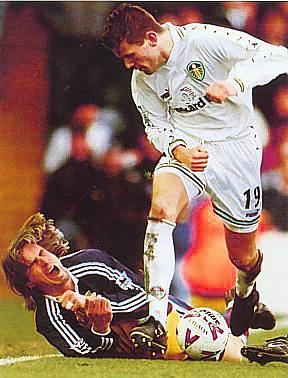 The
most significant departure was Hasselbaink, off to Atletico Madrid for
£12m when United refused to meet his wage demands of £30,000 per week.
The
most significant departure was Hasselbaink, off to Atletico Madrid for
£12m when United refused to meet his wage demands of £30,000 per week.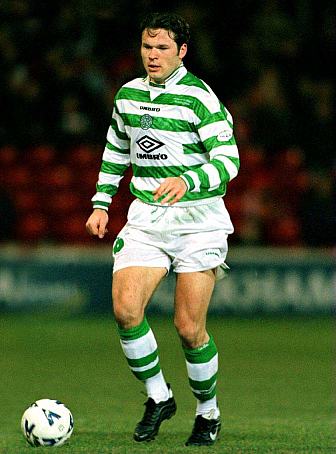 comprising
Barcelona, AC Milan and Besiktas.
comprising
Barcelona, AC Milan and Besiktas.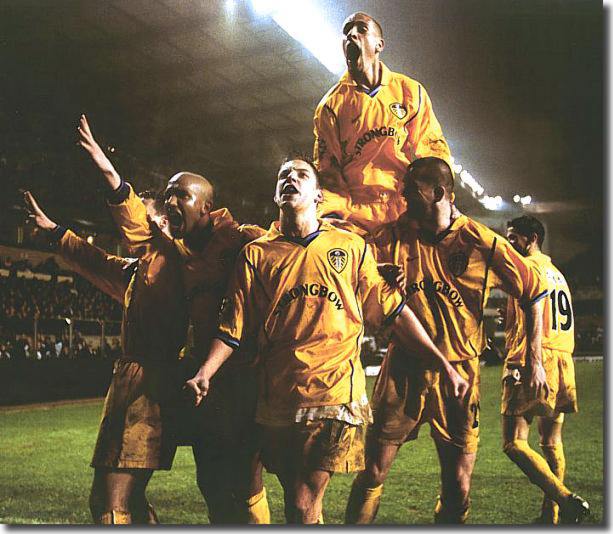 Brussels.
Brussels.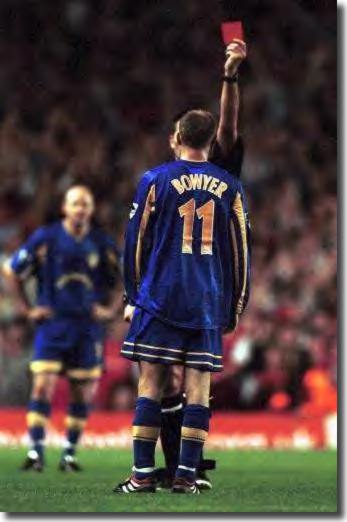 kept
them in the early running and a 2-0 victory against Charlton took them
top, a position cemented by a 3-0 demolition of Derby and victory at Ipswich.
kept
them in the early running and a 2-0 victory against Charlton took them
top, a position cemented by a 3-0 demolition of Derby and victory at Ipswich.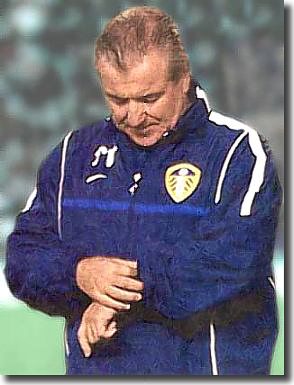 promoted
Manchester City and West Bromwich Albion. Defeats followed against Sunderland
and Birmingham but then United won 2-0 at Newcastle and beat Manchester
United at Elland Road courtesy of a Harry Kewell header.
promoted
Manchester City and West Bromwich Albion. Defeats followed against Sunderland
and Birmingham but then United won 2-0 at Newcastle and beat Manchester
United at Elland Road courtesy of a Harry Kewell header.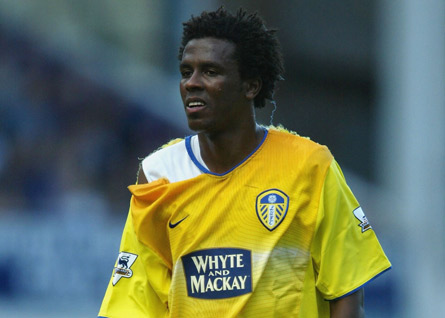 When
the Brazilian suffered a nightmare at the hands of Everton's Duncan Ferguson,
losing his shirt as United were hammered 4-0, it was clear that he was
no Messiah.
When
the Brazilian suffered a nightmare at the hands of Everton's Duncan Ferguson,
losing his shirt as United were hammered 4-0, it was clear that he was
no Messiah.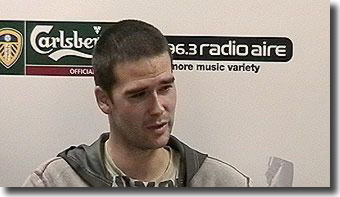 2003 after coming off the bench at Spurs, aged just 16 years and 129 days,
made his first League start and scored his first goal in a victory at
Sunderland on Boxing Day.
2003 after coming off the bench at Spurs, aged just 16 years and 129 days,
made his first League start and scored his first goal in a victory at
Sunderland on Boxing Day.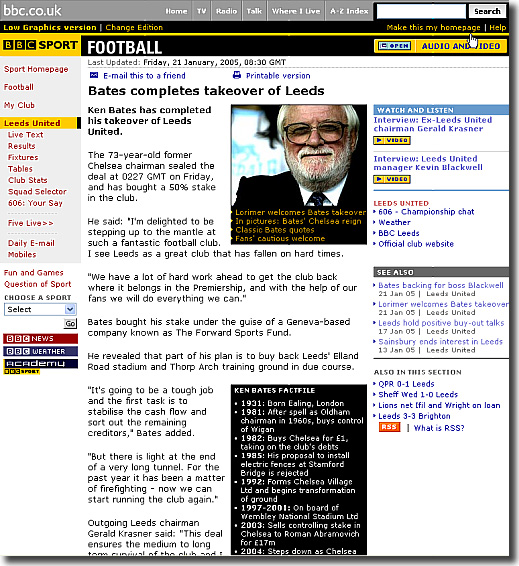 the
Whites.
the
Whites.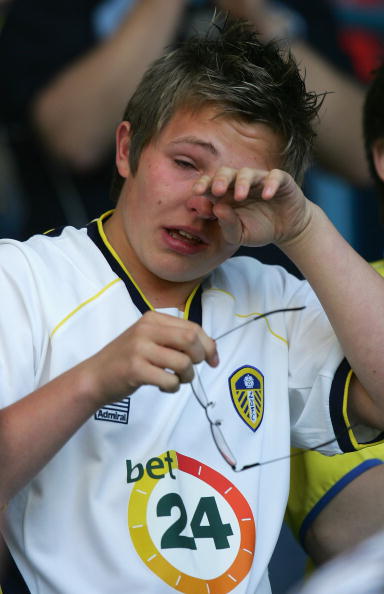 Cardiff
effectively sealed their fate. Thousands of fans spilled on to the pitch
in stoppage time in an attempt to get the game abandoned, but to no avail.
Cardiff
effectively sealed their fate. Thousands of fans spilled on to the pitch
in stoppage time in an attempt to get the game abandoned, but to no avail.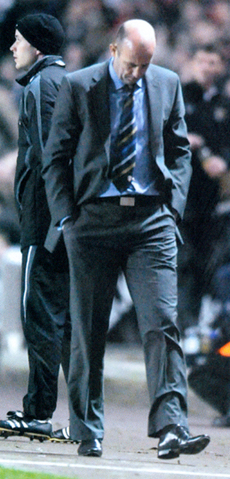 30
November, their first ever defeat to a non-League outfit. The mud bath
of a pitch suited the part timers and United were undone by a first half
goal from a corner.
30
November, their first ever defeat to a non-League outfit. The mud bath
of a pitch suited the part timers and United were undone by a first half
goal from a corner.